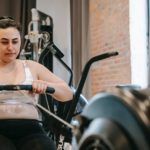The rotator cuff is a group of 4 muscles and tendons that stabilize the shoulder and provide a dynamic range of motion for your arm. Every time you move your shoulder, the rotator cuff is engaged in some way. As you may expect, this makes it a prime target for wear and tear damage over time.
So, how do you know if you have a Calgary rotator cuff injury? Well, a feeling of pain is usually a good indication, but sometimes that will not happen. Many people live large parts of their lives with these injuries and don’t even realize it.
Although there are other ways to determine if you have a rotator cuff injury in Calgary. Here is a list of common symptoms of this injury:
- You avoid painful activities
- Pain in your shoulder, especially in the evenings
- Difficulty with the full range of your shoulder’s motion
- Difficulty when you sleep on your affected shoulder
- You have trouble reaching behind the back
- A pain or tenderness when you reach overhead
- A progressive weakness in your shoulder
As you can see, many of these symptoms will gradually accumulate and cause greater levels of pain over time. Below we look at the most common injuries for this type of injury.
Common Rotator Cuff Injuries

Strains
Strains are likely the most common culprit of this injury. They are the result of acute injury or overuse of the muscle group as a whole. There are a large number of reasons for strains to occur, such as overactivity, falling, vehicle collisions, team sports, and more.
Tendinitis
Tendinitis is the result of overuse of the rotator cuff, which causes the area to become inflamed. Most commonly, this injury is associated with lots of overhead work, like painters and electricians.
Bursitis
Bursas are little sacks of fluid that exist around our muscle groups and joints. They provide the critical function of cushioning or padding the movable areas of your muscles, tendons, and ligaments. They can become inflamed and may be the cause of pain or injury in your rotator cuff.
Now that we have looked at the common ways for your rotator cuff to be injured, the next step will be to discuss possible methods of treating your injury.
Treatment Methods for Calgary Rotator Cuff Injuries
The RICE Method
One of the most effective ways to treat strains and chronic pain is the RICE method. You have probably used this method in your own life in the past, but here is a brief overview of all the steps involved:
Rest – avoid placing weight on the knee and take time to heal
Ice – Wrap ice in a bag or cloth and apply to the knee for 20 minutes or so
Compress – Wrap the knee with an elastic bandage to reduce swelling. Remember snug, not tight
Elevate – Elevate the knee by placing it higher than the heart
Additionally, you may wish to consider using hot packs as well. The warmth can help loosen tight muscles and provide relief.
Consulting a Physiotherapist
Consulting with a physiotherapist may be the best way to treat a rotator cuff injury. They have the training, education, and experience necessary to provide stretches and other advice for optimal healing of shoulder pain. Included in their advice may be a push to begin regular exercise. This will help restore muscle strength in the area and return your shoulder’s full range of motion.
Cortisone Injections
Cortisone injections are a way to relieve pain and inflammation from a specific area of your body. They typically include a corticosteroid and local anesthetic. The first part helps to alleviate the inflammation, and the latter is to reduce the feeling of pain from the needle.
To receive this treatment, you will have to speak with your family doctor or a general practitioner, as they will be able to inform you of the potential side effects and administer the treatment. If the pain in your shoulder is not from a rotator cuff tear but rather a degenerative disease like osteoarthritis, the treatment will be very effective.
Medications
There are also several medications that you can receive from your local pharmacy. These will usually be anti-inflammatory medications, and to find the one that is right for you, speak with your pharmacist.
Welcome to Brentwood Physiotherapy, your trusted Calgary physiotherapy clinic. For over 16 years, our experienced physiotherapists have been treating individuals suffering from acute to chronic conditions, with one goal. The goal is to address the core cause of their pain and put them on the road to recovery. Get back on the path to a healthier you by contacting Brentwood Physiotherapy today at 403-282-8050




